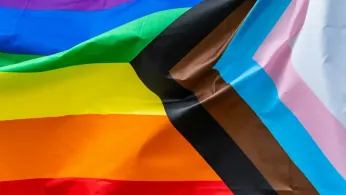
4 hours ago
Gay Former FBI Analyst Sues Kash Patel and Pam Bondi Over Pride Flag Termination
READ TIME: 3 MIN.
The battle over rainbow flags isn’t just about cloth and color—it’s about identity, power, and the right to show up authentically, even in the shadowy corridors of federal law enforcement. That’s the backdrop for a lawsuit filed by Brian Auten, a seasoned FBI counterintelligence analyst who claims he was fired for displaying a Pride flag in his office. The defendants? Kash Patel, a former Trump administration official, and Pam Bondi, ex-Florida attorney general—two names synonymous with high-stakes conservative politics .
Auten’s suit isn’t just another workplace discrimination story—it’s a flashpoint in the culture wars over LGBTQ+ visibility, government neutrality, and the personal cost of queer pride. For a community that’s long been surveilled, marginalized, and sometimes outright erased in federal spaces, the case resonates far beyond one rainbow flag.
Auten, who spent over two decades serving the FBI and worked on high-profile investigations, says he was “targeted and terminated” after showing support for LGBTQ+ colleagues and displaying a Pride flag—an act he describes as both personal and political . According to court filings, Patel and Bondi allegedly orchestrated a campaign to oust Auten, citing his public support for LGBTQ+ causes as a breach of “neutrality. ”
“I put up the flag because it mattered—to me, to my queer colleagues, and to anyone who needs to know that visibility isn’t just allowed, it’s necessary, ” Auten reportedly said in a statement included in legal filings .
The defendants argue that displaying any political symbol—rainbow or otherwise—compromises the impartiality of federal employees. But for many, the rainbow flag is more than politics; it’s survival, solidarity, and hope in environments where being out can still mean being alone.
Federal buildings have long been battlegrounds for what gets seen, celebrated, or suppressed. For LGBTQ+ folks, visibility at work isn’t just about self-expression—it’s about challenging the historic silence that has kept so many in the closet, especially in national security roles .
Legal experts say Auten’s suit could set precedent on how the First Amendment applies to displays of queer identity in federal workspaces—and whether “neutrality” is a shield for discrimination or a genuine value .
Pam Bondi, a frequent Fox News guest and Trump ally, has publicly opposed LGBTQ+ rights, while Patel has been a vocal critic of “politicized” symbols in government. But for LGBTQ+ employees, displaying a rainbow is often less about politics and more about feeling safe and seen .
“Visibility is a form of resistance, ” notes LGBTQ+ historian Eric Cervini. “When queer people put up a flag, especially in a space that’s been historically hostile, they’re saying: I’m here, and I’m not going anywhere” .
For many queer people, especially those in high-pressure or conservative fields, Auten’s story is painfully familiar. “It’s not just about a flag—it’s about a lifetime spent negotiating who you can be at work, ” says Mia, a federal employee and out lesbian, in a phone interview . “Every time someone tries to take down a symbol of pride, it’s a message that your existence is still up for debate. ”
Auten’s case, now winding its way through federal court, arrives at a moment when LGBTQ+ visibility in government has become both more common and more fraught. In recent years, queer employees have reported rising hostility, increased scrutiny, and mounting pressure to keep their identities under wraps—especially in national security and law enforcement settings .
The outcome of this lawsuit could have ripple effects far beyond the FBI. If Auten wins, it could embolden queer employees to insist on visibility and protections in other agencies. If he loses, it could set back the fragile gains made in recent years.
The story of Brian Auten, Kash Patel, and Pam Bondi is more than a legal skirmish—it’s a mirror for bigger questions about who gets to be visible, who decides what counts as “neutral, ” and whether the government is ready to embrace the diversity of its own workforce.
For LGBTQ+ readers, this isn’t just headline fodder—it’s a reminder that every flag, every pronoun, every out-and-proud moment in the workplace is shaped by battles fought in courtrooms and cubicles alike. “We’re not just fighting for ourselves, ” Auten’s supporters say. “We’re fighting for every queer person who’s ever wondered whether it’s safe to bring their full self to work” .
As the lawsuit unfolds, one thing is clear: the fight for queer visibility is far from over—and every rainbow flag raised in a government hallway is a small act of revolution.






